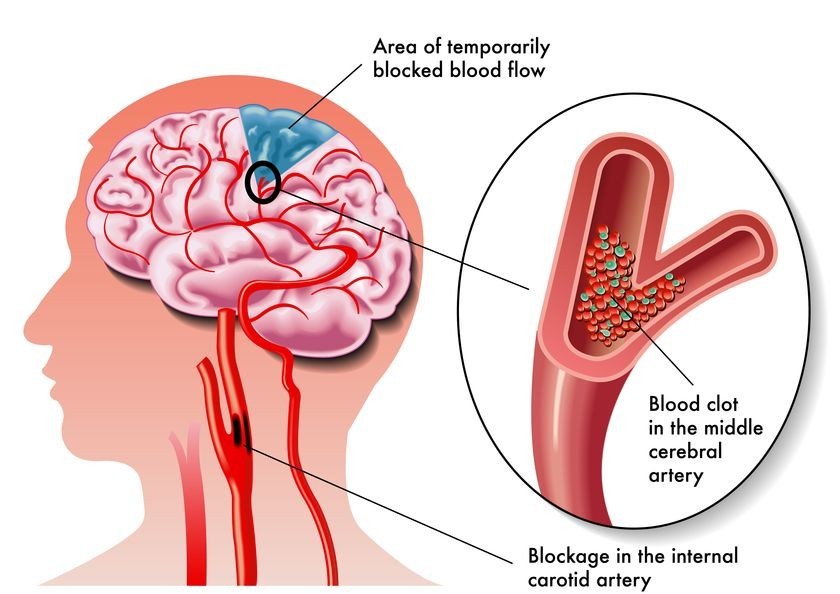STROKE

A stroke means that the blood supply to a part of the brain is suddenly cut off. The brain cells need a constant supply of oxygen from the blood. Soon after the blood supply is cut off, the cells in the affected area of brain become damaged or die. A stroke is sometimes called a brain attack.
A brain stroke/brain attack/paralysis is major public health burden in our country. Public awareness is the key to fight against such life threatening disease spectrum. In India, we have approximately 4500 stroke patients per day.
What is stroke and how to recognize the symptoms of stroke?
Stroke is a serious medical emergency as a result of sudden interruption of blood supply of the brain due to blood clot blocking the blood vessels (blood carrying tubes) or bleeding inside the brain, resulting in brain damage. Stroke symptoms are easily recognized with acronym FAST.
- Facial weakness resulting in drooping of half of the face.
- Arm or leg weakness (inability to move arm or leg)
- Speech problems like inability to speak / difficulty in speaking.
- Time to reach to stroke-ready hospital.
What are the available treatment option for stroke patients?
First the stroke physician examines the patient and confirms the diagnosis of stroke. Generally, immediately CT brain is done to guide the treatment. If the patient has reached the hospital in less than 4.5 hours from the stroke onset, clot dissolving injection can be given with the intention to restore the normal blood supply hence limiting the damage to the brain. In patients with blockage of larger blood vessels, endovascular mechanical thrombectomy is the treatment to open the blocked blood vessel and normalize the blood flow to brain.
The most important aspect of stroke-care is that treatment benefit is time dependent and hence, TIME IS BRAIN. Stroke patient should reach hospital as early as possible to get higher treatment benefit.
What is mechanical thrombectomy treatment in stroke patients?
This is a new treatment for the stroke patient, wherein neurovascular surgeon removes blood clot from the brain vessels using new techniques (the same way cardiologist does it for the heart attack). This is the only and best treatment in stroke patient till 6 hours from stroke onset, in whom one of the larger blood vessel is blocked as a result of blood clots.
The sooner this treatment is given, the more successful it is likely to be. In some circumstances, clot removal may be offered if the stroke symptoms started 6-24 hours ago if you were well before the stroke. This will only be considered if the scans show there is a chance of the brain tissue affected recovering.
This treatment has revolutionized the management of acute stroke patients and now is the standard of care in these patient. All stroke patient are advisable to visit the hospital which has 24x7 facilities and expertise of mechanical thrombectomy procedure.
What is the benefit of comprehensive stroke center for Patients?
Worldwide Concept of comprehensive stroke unit or stroke ready hospital is changing the algorithm of emergency stroke management. All the specialist including neurology, neurointervention, neurosurgery and critical care medicine follows integrated approach of decision making for that particular patient. Dedicated hospital infrastructure like advanced stroke Imaging (CT/MRI angiography), Cath lab facilities for mechanical thrombectomy, stroke ICU and stroke physiotherapy unit are the key aspect of stroke center/ stroke ready hospital. It is established fact that stroke patients treated at such centers have much better outcome.
What are the preventive measures for stroke?
The important risk factors associated with stroke are cigarette smoking, alcohol consumption, high blood pressure, high cholesterol levels and diabetes mellitus. Regular physician consultation is one aspect to identify these risk factors and treat them accordingly. Lifestyle modification to reduce obesity like regular exercise and healthy diet is another aspect.
What is the role of stroke Rehabilitation?
The aim of rehabilitation is to maximise activity and quality of life following a stroke. The final aim in the management of any stroke patient is to make him/her functionally independent. Hospitals which deal with stroke patients have various specialists who help in rehabilitation. These include physiotherapists, occupational therapists, speech therapists, dieticians, psychologists, specialist nurses and doctors. One or more of these may be required, depending on how the stroke has affected you. Good-quality rehabilitation is vital following a stroke and can make a big difference to your eventual outcome.

